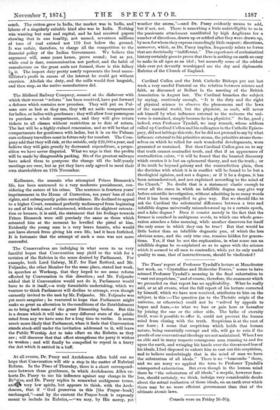The Times' report of Professor Tyndall's lecture at Manchester last
week, on ,4 Crystalline and Molecular Forces," seems to have misssed Professor Tyndall's meaning in the final exhortation to "cast out scepticism," and of course, therefore, the comment which we grounded on that report has no applicability. What he really said, or at all events, what the full report of his lecture corrected by himself, which we have now received, attributes to him on the subject, is this :—The question (as to the Theistic origin of the universe, or otherwise) could not be "solved by appeals to hopes and fears,—to what we lose or gain here or hereafter by joining the one or the other aide. The bribe of eternity itself, were it possible to offer it, could not prevent the human mind from closing with the truth. Scepticism is at the root of our fears ; I mean that scepticism which holds that human nature, being essentially corrupt and vile, will go to ruin if the proofs of our conventional theology are not maintained. When I see an able and in many respects courageous man running to and fro upon the earth, and wringing his hands over the threatened loss of his ideals, I feel disposed to exhort him to cast out this scepticism, and to believe undoubtingly that in the mind of man we have the substratum of all ideals." There is no " buncombe " there, and we are sorry we applied the term to Professor Tyndall's misreported exhortation. But even though in the human mind there be "the substratum of all ideals," a sceptic, however fear- less, should certainly, we think, indulge very considerable doubt about the actual realisation of those ideals, on an earth over which there may be no more efficient government than that of the ultimate atomic laws.


































 Previous page
Previous page